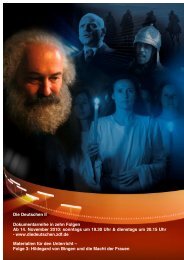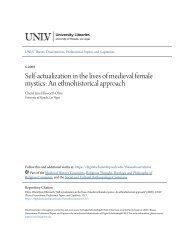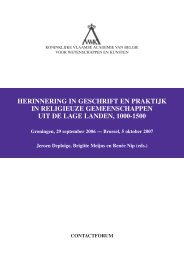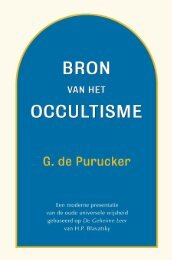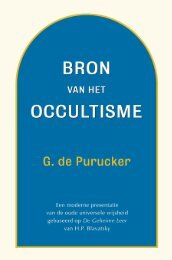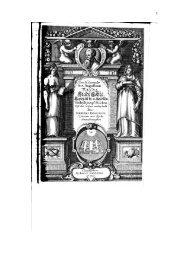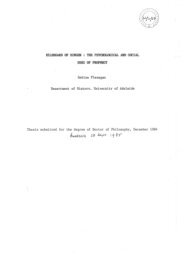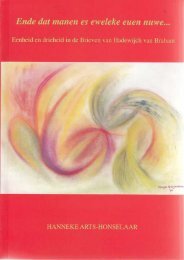- Page 1 and 2:
A Companion to Hildegard of Bingen
- Page 3 and 4:
A Companion to Hildegard of Bingen
- Page 5 and 6:
CONTENTS Notes on Contributors ....
- Page 7 and 8:
NOTES ON CONTRIBUTORS Michael Embac
- Page 9:
notes on contributors ix with parti
- Page 12 and 13:
xii abbreviations Epistolarium, III
- Page 15 and 16:
ACKNOWLEDGMENTS The editors wish to
- Page 17 and 18:
TIMELINE FOR HILDEGARD OF BINGEN’
- Page 19:
THE REGION OF HILDEGARD OF BINGEN s
- Page 22 and 23:
2 kienzle and stoudt as well emphas
- Page 24 and 25:
4 kienzle and stoudt A Companion to
- Page 26 and 27:
6 kienzle and stoudt Elisabeth of S
- Page 28 and 29:
8 kienzle and stoudt Finally, the a
- Page 30 and 31:
10 kienzle and stoudt over the cour
- Page 32 and 33:
12 kienzle and stoudt also an (illu
- Page 35 and 36:
WHAT DO WE KNOW ABOUT THE LIFE OF J
- Page 37 and 38:
what do we know about the life of j
- Page 39 and 40:
what do we know about the life of j
- Page 41 and 42:
what do we know about the life of j
- Page 43 and 44:
what do we know about the life of j
- Page 45 and 46:
what do we know about the life of j
- Page 47 and 48:
what do we know about the life of j
- Page 49 and 50:
what do we know about the life of j
- Page 51 and 52:
what do we know about the life of j
- Page 53 and 54:
what do we know about the life of j
- Page 55 and 56:
what do we know about the life of j
- Page 57 and 58:
what do we know about the life of j
- Page 59 and 60:
ST DISIBOD AND THE HISTORY OF THE D
- Page 61 and 62:
st disibod and the history of the d
- Page 63 and 64:
st disibod and the history of the d
- Page 65 and 66:
st disibod and the history of the d
- Page 67 and 68:
st disibod and the history of the d
- Page 69 and 70:
st disibod and the history of the d
- Page 71 and 72:
st disibod and the history of the d
- Page 73 and 74:
st disibod and the history of the d
- Page 75:
st disibod and the history of the d
- Page 78 and 79:
58 constant j. mews least as practi
- Page 80 and 81:
60 constant j. mews Hildegard was r
- Page 82 and 83:
62 constant j. mews a religious lif
- Page 84 and 85:
64 constant j. mews how Archbishop
- Page 86 and 87:
66 constant j. mews gathered around
- Page 88 and 89:
68 constant j. mews have copied at
- Page 90 and 91:
70 constant j. mews life to come se
- Page 92 and 93:
72 constant j. mews Augustinian com
- Page 94 and 95:
74 constant j. mews “the ways of
- Page 96 and 97:
76 constant j. mews true life” (r
- Page 98 and 99:
78 constant j. mews the language of
- Page 100 and 101:
80 constant j. mews Disibodenberg,
- Page 102 and 103:
82 constant j. mews into bloom, and
- Page 105 and 106:
UNEQUAL TWINS: VISIONARY ATTITUDE A
- Page 107 and 108:
unequal twins 87 nifijicat (Quia re
- Page 109 and 110:
unequal twins 89 In this study, how
- Page 111 and 112:
unequal twins 91 Maria consors mart
- Page 113 and 114:
unequal twins 93 amazing popularity
- Page 115 and 116:
unequal twins 95 An important conf
- Page 117 and 118:
unequal twins 97 and shared its lit
- Page 119 and 120:
unequal twins 99 common musical com
- Page 121 and 122:
unequal twins 101 Could we imagine
- Page 123 and 124:
unequal twins 103 interpreted as a
- Page 125 and 126:
unequal twins 105 Hildegard’s son
- Page 127 and 128:
unequal twins 107 encounter with th
- Page 129 and 130:
HILDEGARD, THE SCHOOLS, AND THEIR C
- Page 131 and 132:
hildegard, the schools, and their c
- Page 133 and 134:
hildegard, the schools, and their c
- Page 135 and 136:
hildegard, the schools, and their c
- Page 137 and 138:
hildegard, the schools, and their c
- Page 139 and 140:
hildegard, the schools, and their c
- Page 141 and 142:
hildegard, the schools, and their c
- Page 143 and 144:
hildegard, the schools, and their c
- Page 145 and 146:
hildegard, the schools, and their c
- Page 147 and 148:
hildegard, the schools, and their c
- Page 149 and 150:
hildegard, the schools, and their c
- Page 151 and 152:
hildegard, the schools, and their c
- Page 153 and 154:
hildegard, the schools, and their c
- Page 155:
hildegard, the schools, and their c
- Page 158 and 159:
138 kienzle and stevens commenting
- Page 160 and 161:
140 kienzle and stevens monks at Vi
- Page 162 and 163:
142 kienzle and stevens Mary, and t
- Page 164 and 165:
144 kienzle and stevens problems oc
- Page 166 and 167:
146 kienzle and stevens Hildegard
- Page 168 and 169:
148 kienzle and stevens Likewise, i
- Page 170 and 171:
150 kienzle and stevens The magistr
- Page 172 and 173:
152 kienzle and stevens Knowledge o
- Page 174 and 175:
154 kienzle and stevens became the
- Page 176 and 177:
156 kienzle and stevens to prophecy
- Page 178 and 179:
158 kienzle and stevens the Rhinela
- Page 180 and 181:
160 kienzle and stevens also chose
- Page 182 and 183:
162 kienzle and stevens memory enjo
- Page 184 and 185:
164 leigh-choate, flynn, and fassle
- Page 186 and 187:
166 leigh-choate, flynn, and fassle
- Page 188 and 189:
168 leigh-choate, flynn, and fassle
- Page 190 and 191:
170 leigh-choate, flynn, and fassle
- Page 192 and 193:
172 leigh-choate, flynn, and fassle
- Page 194 and 195:
174 leigh-choate, flynn, and fassle
- Page 196 and 197:
176 leigh-choate, flynn, and fassle
- Page 198 and 199:
178 leigh-choate, flynn, and fassle
- Page 200 and 201:
180 leigh-choate, flynn, and fassle
- Page 202 and 203:
182 leigh-choate, flynn, and fassle
- Page 204 and 205:
184 leigh-choate, flynn, and fassle
- Page 206 and 207:
186 leigh-choate, flynn, and fassle
- Page 208 and 209:
188 leigh-choate, flynn, and fassle
- Page 210 and 211:
190 leigh-choate, flynn, and fassle
- Page 212 and 213:
192 leigh-choate, flynn, and fassle
- Page 214 and 215:
194 leigh-choate, flynn, and fassle
- Page 216 and 217:
196 leigh-choate, flynn, and fassle
- Page 218 and 219:
198 leigh-choate, flynn, and fassle
- Page 220 and 221:
200 leigh-choate, flynn, and fassle
- Page 222 and 223:
202 leigh-choate, flynn, and fassle
- Page 224 and 225:
204 leigh-choate, flynn, and fassle
- Page 226 and 227:
206 leigh-choate, flynn, and fassle
- Page 228 and 229:
208 leigh-choate, flynn, and fassle
- Page 230 and 231:
210 leigh-choate, flynn, and fassle
- Page 232 and 233:
212 leigh-choate, flynn, and fassle
- Page 234 and 235:
214 leigh-choate, flynn, and fassle
- Page 236 and 237:
216 leigh-choate, flynn, and fassle
- Page 238 and 239:
218 leigh-choate, flynn, and fassle
- Page 240 and 241:
220 leigh-choate, flynn, and fassle
- Page 242 and 243:
222 susanne ruge linked to the part
- Page 244 and 245:
224 susanne ruge An outline is incl
- Page 246 and 247:
226 susanne ruge in the Vite mer. t
- Page 248 and 249:
228 susanne ruge Thus, even before
- Page 250 and 251:
230 susanne ruge These two primary
- Page 252 and 253:
232 susanne ruge Since the devil is
- Page 254 and 255:
234 susanne ruge in the tradition o
- Page 256 and 257:
236 susanne ruge In response, the v
- Page 258 and 259:
238 susanne ruge blessed who await
- Page 260 and 261:
240 susanne ruge levels do not diff
- Page 262 and 263:
242 susanne ruge the murder of a ch
- Page 264 and 265:
244 susanne ruge teacher or judge (
- Page 266 and 267:
246 susanne ruge The Benedictine Ru
- Page 268 and 269:
248 susanne ruge (vices) and in the
- Page 270 and 271:
250 debra l. stoudt Translations of
- Page 272 and 273:
252 debra l. stoudt St Augustine (3
- Page 274 and 275:
254 debra l. stoudt appeared in the
- Page 276 and 277:
256 debra l. stoudt are useful in i
- Page 278 and 279:
258 debra l. stoudt of life,”39 a
- Page 280 and 281:
260 debra l. stoudt physical and sp
- Page 282 and 283:
262 debra l. stoudt begins with Ada
- Page 284 and 285:
264 debra l. stoudt Hildegard is af
- Page 286 and 287: 266 debra l. stoudt As an amulet, t
- Page 288 and 289: 268 debra l. stoudt account of Chri
- Page 290 and 291: 270 debra l. stoudt exorcism, compl
- Page 292 and 293: 272 debra l. stoudt The Antichrist
- Page 294 and 295: 274 michael embach Pentachronon and
- Page 296 and 297: 276 michael embach Chapter in Pragu
- Page 298 and 299: 278 michael embach for the canoniza
- Page 300 and 301: 280 michael embach the successful e
- Page 302 and 303: 282 michael embach texts compiled d
- Page 304 and 305: 284 michael embach that will afffli
- Page 306 and 307: 286 michael embach that Winand was
- Page 308 and 309: 288 michael embach University, Ms.
- Page 310 and 311: 290 michael embach cannot be consid
- Page 312 and 313: 292 michael embach In addition, he
- Page 314 and 315: 294 michael embach Hildegard in his
- Page 316 and 317: 296 michael embach saint’s nimbus
- Page 318 and 319: 298 michael embach Jacobus de Guis
- Page 320 and 321: 300 michael embach works in his com
- Page 322 and 323: 302 michael embach produced by a Je
- Page 324 and 325: 304 michael embach of Hildegardian
- Page 326 and 327: 306 george ferzoco ignored. Thus, t
- Page 328 and 329: 308 george ferzoco sent their revis
- Page 330 and 331: 310 george ferzoco better part of t
- Page 332 and 333: 312 george ferzoco Hildegardis, vir
- Page 334 and 335: 314 george ferzoco and was complete
- Page 338 and 339: 318 george ferzoco in providing a l
- Page 340 and 341: 320 george ferzoco II.B. Church off
- Page 342 and 343: 322 george ferzoco but it also show
- Page 344 and 345: 324 bibliography München, Bayerisc
- Page 346 and 347: 326 bibliography Gerard of Csanad.
- Page 348 and 349: 328 bibliography Johannes Afffligem
- Page 350 and 351: 330 bibliography ——. Guillelmi
- Page 352 and 353: 332 bibliography Bund, Konrad. “D
- Page 354 and 355: 334 bibliography ——. “Platoni
- Page 356 and 357: 336 bibliography ——. “Ductus
- Page 358 and 359: 338 bibliography Alfred Haverkamp,
- Page 360 and 361: 340 bibliography Jonsson, Ritva. Hi
- Page 362 and 363: 342 bibliography May, Johannes. Die
- Page 364 and 365: 344 bibliography Oxford Music Onlin
- Page 366 and 367: 346 bibliography Staab, Franz. “R
- Page 369 and 370: INDEX Abelard, Peter 117n36, 127, 1
- Page 371 and 372: index 351 Cuno, abbot of Disibodenb
- Page 373 and 374: index 353 Helenger, abbot 207 hell
- Page 375 and 376: index 355 Leclerq, Jean, scholar 10
- Page 377 and 378: index 357 Paul of Bernried 67-68 Pa
- Page 379 and 380: index 359 theology, creation 78, 10




